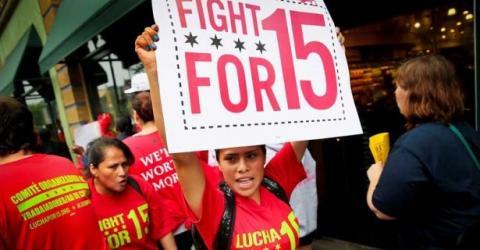
March 23, 2016
by Ian Ansel
Turn on the news and witness the constant protests supporting the “Fight for $15” movement. The activists claim $15 an hour is the new minimum necessary for a “livable wage.” The debate over increasing the minimum wage has typically been a back and forth exchange of hypotheticals with one side claiming what an individual may need while the other claims what the individual deserves. The wage battle is alive and well in Milwaukee. Unfortunately, those demanding “Fight for $15” fail to see the unintended consequences of what they are proposing.
Non-profits organizations have been completely ignored in the current minimum wage debate. One Milwaukee non-profit organization is the Pettit National Ice Center. A treasure to the community, “the Pettit” is a rare facility as it is one of only two Olympic Ovals in the entire United States. The Pettit provides Milwaukeeans and Wisconsinites a family-friendly venue for recreational skating, running, and an indoor workout space for local high school and college teams, as well as elite level training for ice hockey, figure skating, and speedskating organizations with an arsenal of potential and current US Olympic athletes. How would the Pettit fare under a mandatory $15 an hour wage increase for all of its staff?
In 2007 the Pettit National Ice Center, Inc., the non-profit which has operated the Pettit since its opening in 1992, bought the facility from the State Fair Park, reducing previously stifling financial burdens brought on by heavy rent payments to the State. However, a $15 minimum wage could throw the organization back into a fiscal distress.
The Pettit, with eleven full-time employees and over a hundred part-time employees and volunteers, already provides even its lowest-paid workers with wages significantly higher than the current minimum wage at roughly $9 an hour. Under its current leadership of Executive Director Randy Dean, the Pettit has been financially healthy. Nevertheless, Dean says a $15 an hour minimum wage “would definitely squeeze us.”
The challenges that organizations like the Pettit would face, but never considered by Milwaukee’s “Fight for $15” activists, are analyzed by Scott W. Allard in his Brookings Institution article “How a rising minimum wage may impact the non-profit sector,”
Increases in the minimum wage are occurring at the same time that many nonprofit service organizations are confronted with fixed or declining revenue streams. Facing fiscal pressure, nonprofit service organizations may pursue one or more coping strategies. In addition to reductions in staffing or hours, commonly expected responses, nonprofits may cut back services offered, scale back service areas, or favor clients that can afford higher fees.[1]
Despite its name “the Pettit,” there is a no continued endowment from the Pettit family. Similarly, the designation of “Official US Olympic Training Site” doesn’t unlock funds from the United States Olympic Committee. The truth is the customers and the community support are the driving force of the Pettit, which is why, according to Dean, the goal is always to keep prices affordable. For example, Dean says he likes to think “a night out to the Pettit for public skate [with skate rental] is cheaper for a family than going out to the movies, and healthier too.” Therefore, a wage increase could eventually mean an increase in prices too, precisely the type of action the Pettit wishes it would not have to impose on its loyal community and customer base.
Of course, the Pettit is just one non-profit organization doing amazing work in Milwaukee. After school, food security, environmental, domestic violence, and other programs would all be negatively affected by an across-the-board doubling of Wisconsin’s minimum wage.
Our thriving community organizations could suffer from minimum wage hike sought by the Milwaukee’s activist crowd. Before policy makers take these calls for a higher wage seriously, these activists should be forced to articulate why driving non-profit organizations into fiscal crisis would benefit the community.
Ian Ansel is a research associate with Milwaukee Works, Inc.